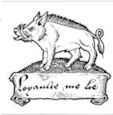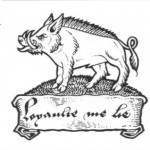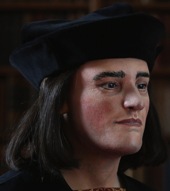A yummy Scrabble Talk on the letter “O”.
 The 14th August meeting – and my scrabble letter talk drawing nigh – I was visited with inspiration when Kim brought home some oranges in the shopping. Could this fruit be the basis of a talk?
The 14th August meeting – and my scrabble letter talk drawing nigh – I was visited with inspiration when Kim brought home some oranges in the shopping. Could this fruit be the basis of a talk?
My research revealed that oranges are first heard of growing wild in China and later cultivated there, from where they found their way to India. The Moors are thought to have planted oranges across North Africa in the first century AD. Oranges were also known to the Romans, who imported the young trees to the port of Ostia. But with the fall of Rome in the fifth century AD, the Roman trade and cultivation of oranges died out for centuries. Read the rest of this entry »
Tags: Medieval Life
Another Scrabble talk in form of a PowerPoint presentation, this time on the letter “T”.
 Treason doth never prosper, what’s the reason?
Treason doth never prosper, what’s the reason?
For if it prosper, who dare call it treason.*
* Sir John Harington, Epigrams
Origins in Roman and Germanic Law
• Treason Laws in England in the later middle ages had roots in Germanic and Roman Law
• German – betrayal or breach of trust by a man against his lord (treubruch). Direct lord rather than hostility towards the king
• Roman – insult to those with public authority (maiestas – greatness, dignity, majesty)
• Concepts that were inherited from the Roman concept: Read the rest of this entry »
Tags: Medieval Life
The following was presented as a PowerPoint presentation as a Scrabble talk for the letter – yes, you guessed it! – “H”.
 Questions?
Questions?
• What did the church have to say about those concepts?
• How did the laity imagine heaven and hell?
• How the great schism influenced the system of beliefs?
• Who went to heaven and who went to hell?
• How did those concepts influence political decisions?
• What other concepts were available?
• Should Richard III have been afraid to where he would end up in the after life?
• Should Henry the VII have been afraid to where he would end up?
• Could you choose where you ended up? Read the rest of this entry »
Tags: Church, Medieval Life
 A review of John Ashdown-Hill’s latest book, The Last Days of Richard III, is now available on our website. You can find it in the “Must Read” section on our Book Shelf or click here.
A review of John Ashdown-Hill’s latest book, The Last Days of Richard III, is now available on our website. You can find it in the “Must Read” section on our Book Shelf or click here.
Tags: Anne Neville, Books, Bosworth, Henry Tudor, Medieval Life, Ricardian Authors, Richard III
Posted by: Dorothea Preis in News

Happy Easter!
In Richard’s time Easter was equally important as Christmas. It came after the six weeks of Lent, a period of fasting, when people had to go without foodstuffs like meat and eggs. Obviously their chickens were not aware of this and continued to lay eggs. These were boiled and put aside for children to search and find them on Easter morning. This tradition represented how the disciples were looking for the risen Jesus in his grave. Richard and Anne’s son Edward would probably have enjoyed an Easter egg hunt, possibly followed by a game of egg rolling. Though these would have been real eggs, not the candy variety most children today regard as Easter eggs.
Easter Sunday would start with a church service at dawn, a tradition which is still alive in many churches, after which everyone was looking forward to a hearty meal and a day off work. Probably Richard would have invited his friends, families and servants to a special feast at Middleham.
We would like to wish all our readers a very happy Easter. We hope you enjoy the holidays and look forward to a free day and a feast.
Note: For more information click here.
Tags: Holiday, Medieval Life
Posted by: Dorothea Preis in News
 In January the team of conservators at Salisbury Cathedral, Wiltshire, made a surprise discovery: when removing the Henry Hyde Monument from a wall in order to repair and clean it, they found hidden behind the monument the remains of some beautifully written English text. The monument marks the grave of Sir Henry Hyde, who was executed in 1650 by Parliament for supporting King Charles I and was erected soon after 1660.
In January the team of conservators at Salisbury Cathedral, Wiltshire, made a surprise discovery: when removing the Henry Hyde Monument from a wall in order to repair and clean it, they found hidden behind the monument the remains of some beautifully written English text. The monument marks the grave of Sir Henry Hyde, who was executed in 1650 by Parliament for supporting King Charles I and was erected soon after 1660.
There are several lines of a large textual inscription, which had subsequently been whitewashed over making it difficult to read but the good gothic lettering is clearly visible. Due to the age of the monument the writing was originally thought to be from the 16th century, when the nave was fitted out with high pews for people to sit in to listen to the ‘new’ sermons preached there. Inscriptions of the bible, the Word of God, would have been written on the inside walls of the building following the Reformation, having been translated into English in Cranmer’s bible. Read the rest of this entry »
Tags: Church, Medieval Life
 The NSW Branch of the Richard III Society wishes all its readers, friends and members a very happy new year.
The NSW Branch of the Richard III Society wishes all its readers, friends and members a very happy new year.
Like with Christmas before, I was wondering what Richard III and his family would have done on New Year’s Eve. Fireworks, champagne and ‘Auld Lang Syne’? Well, not quite. For starters ‘Auld Lang Syne’ was only written by Robert Burns in 1788 (1). At that time fireworks were well established in England as Georg Friedrich Händel’s ‘Music for the Royal Fireworks’, composed in 1749 (2), shows, though they do go back to 12th century China and have been recorded in Europe since 1258 (3). Read the rest of this entry »
Tags: Christmas, Medieval Life, Richard III
 Our final meeting for the year and our Christmas party was held on the 12th December. First, we welcomed Jennie, a visitor from England. Further discussion was held on the design of the Australasian flag which will be a distinctive item along with our wreath at Sutton Cheney church. This matter will be resolved after consultation with the other Australasian branches. Our Secretary Julia spoke about next year’s speakers and their topics, and about the mini-conference to be held in May.
Our final meeting for the year and our Christmas party was held on the 12th December. First, we welcomed Jennie, a visitor from England. Further discussion was held on the design of the Australasian flag which will be a distinctive item along with our wreath at Sutton Cheney church. This matter will be resolved after consultation with the other Australasian branches. Our Secretary Julia spoke about next year’s speakers and their topics, and about the mini-conference to be held in May.
Our guest speaker was Chairperson Judith Hughes, who spoke on the topic ‘The Twelve Days of Christmas’ – the real meaning behind this popular carol, as well as an overview of medieval Christmas customs. After this most interesting talk, we held our party – complete with Christmas cake prepared by Julia, and our ‘bring and buy’ table did good business.
The final part of the meeting was a game of scattergories. A Scrabble tile is chosen and a sheet filled in with a person’s name of that letter, a town, river, battle and cathedral. As usual, Kevin our Social Secretary prevailed.
Our Society has enjoyed a successful year and all members are looking forward to the next meeting in February.
Merry Christmas to all.
Tags: Christmas, Medieval Life, NSW Branch
 Don’t forget that this coming Saturday, 12 December 2009, we will have our last meeting for this year. Judith will reveal to us the hidden meanings behind all the gifts “my true love sent to me” in the song “The Twelve Days of Christmas” – what an interesting talk this promises to be! Afterwards small groups will compete in a game of Scattergories. The afternoon will conclude with our Christmas celebration.
Don’t forget that this coming Saturday, 12 December 2009, we will have our last meeting for this year. Judith will reveal to us the hidden meanings behind all the gifts “my true love sent to me” in the song “The Twelve Days of Christmas” – what an interesting talk this promises to be! Afterwards small groups will compete in a game of Scattergories. The afternoon will conclude with our Christmas celebration.
As usual the meetings will be held at The Sydney Mechanics’ School of Arts, 280 Pitt Street, Sydney at 2pm. Please remember to bring your own mug for afternoon tea.
And if you would like to find out more about us, remember visitors are always most welcome!
Tags: Medieval Life, NSW Branch, Richard III
 A good crowd of members and friends turned up for our meeting, despite the change to the third Saturday of the month because of the Easter long weekend. Carol Gerrard, our Chairperson, was happy to welcome one of our most recent members, Rayma Turton, who had made the trip from the Blue Mountains to attend her first meeting with us, the first of many such visits we hope. Read the rest of this entry »
A good crowd of members and friends turned up for our meeting, despite the change to the third Saturday of the month because of the Easter long weekend. Carol Gerrard, our Chairperson, was happy to welcome one of our most recent members, Rayma Turton, who had made the trip from the Blue Mountains to attend her first meeting with us, the first of many such visits we hope. Read the rest of this entry »
Tags: Medieval Life, NSW Branch
 Treason doth never prosper, what’s the reason?
Treason doth never prosper, what’s the reason?





 A good crowd of members and friends turned up for our meeting, despite the change to the third Saturday of the month because of the Easter long weekend. Carol Gerrard, our Chairperson, was happy to welcome one of our most recent members, Rayma Turton, who had made the trip from the Blue Mountains to attend her first meeting with us, the first of many such visits we hope.
A good crowd of members and friends turned up for our meeting, despite the change to the third Saturday of the month because of the Easter long weekend. Carol Gerrard, our Chairperson, was happy to welcome one of our most recent members, Rayma Turton, who had made the trip from the Blue Mountains to attend her first meeting with us, the first of many such visits we hope. 